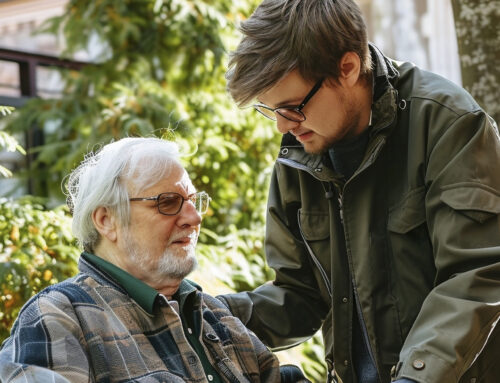Several years ago, I had a client named Johnny; like so many others with dementia, he experienced urinary tract infections often, which, for him, frequently led to hospitalizations. One infection left him hospitalized for two weeks and needing a subsequent stay at a rehab facility. Shortly after arriving at rehab, Johnny was seen by a physical therapist who attempted to get him to walk. Despite his best efforts, the therapist was unsuccessful. He reported to the nursing department that his patient no longer possessed the ability to walk, and Johnny’s wife, Diane, was informed that the facility scheduled a hospice consultation. His spouse was horrified, knowing that her husband could walk and wasn’t following directions because he had difficulty understanding verbal language. She also knew that lengthy hospital stays increased delirium in persons with dementia and that this factor most likely made his inability to understand what others said even more challenging. Diane contacted me for help, and I immediately went to the facility. Once I arrived, Diane and I met with the therapist and the director of nursing. I informed them that I was certain that Johnny could still walk and that he was a kinesthetic learner proficient at communicating through touch. We went to Johnny’s room. After getting him to stand, I asked him to take a step forward, but he did not respond. I knelt down and again asked him to step forward, but I also touched the back of his calf this time. Upon doing this, Johnny stepped forward. I got Johnny to walk because I knew him well and was aware of his preferred learning methods by conducting a multiple intelligence survey. If I hadn’t taken the time to learn about him, he may have been placed in hospice and passed away prematurely. Johnny lived for another two years and, despite his condition, enjoyed the remainder of his life.
Last year, while working with a client in a memory care facility, I was approached by a concerned son of another resident. The person explained that his mother, Cheryl, had moved there several weeks earlier and had since lost much weight. Her son, Chris, explained that since moving into the facility, she seemed to have lost interest in eating and would only have a few bites at each meal. His mother had a nutritional consult, and the dietician prescribed the nutritional supplement Ensure, but again, she only consumed a small amount. Chris told me that he had received a call from the facility earlier that day, and a nurse told him that his mother most likely wasn’t eating because she was approaching the end of life and that he should start considering placing his mother in hospice. Chris didn’t know what to do and told me that up until her move, she had a great appetite. I explained the Theory of Multiple Intelligences to him and proposed that I administer the test, as it may explain why his mother wasn’t eating. He agreed, and the test concluded that she possessed intrapersonal intelligence, a learning type where individuals often function best when alone. I told the son that her disinterest in food may have to do with the fact that she is being served meals in a dining room with the other residents and that she might eat better in a quiet environment. He was more than willing to try this and told me he would call me later that evening after his mother was given dinner. When he called, I knew from the excitement in his voice that the intervention had worked. Chris informed me that she had eaten everything.
After sharing this news with the staff, they agreed to let her eat apart from the other residents and said the hospice consult was no longer needed.
These are only two of the many instances I’ve encountered in my career, and I’m sure that people with dementia are prematurely placed in hospice daily. It’s frightening to know that individuals’ lives are often shortened because those tasked with providing care don’t know them well. Multiple intelligences can help us better understand individuals with dementia and can be especially helpful to people who do not have surviving relatives to provide information about them. I hope that our MISPWD© (Multiple Intelligence Survey for Persons with Dementia), the first MI test specifically designed for people with dementia, becomes an industry standard to help individuals avoid untimely death.
-Matt Call





